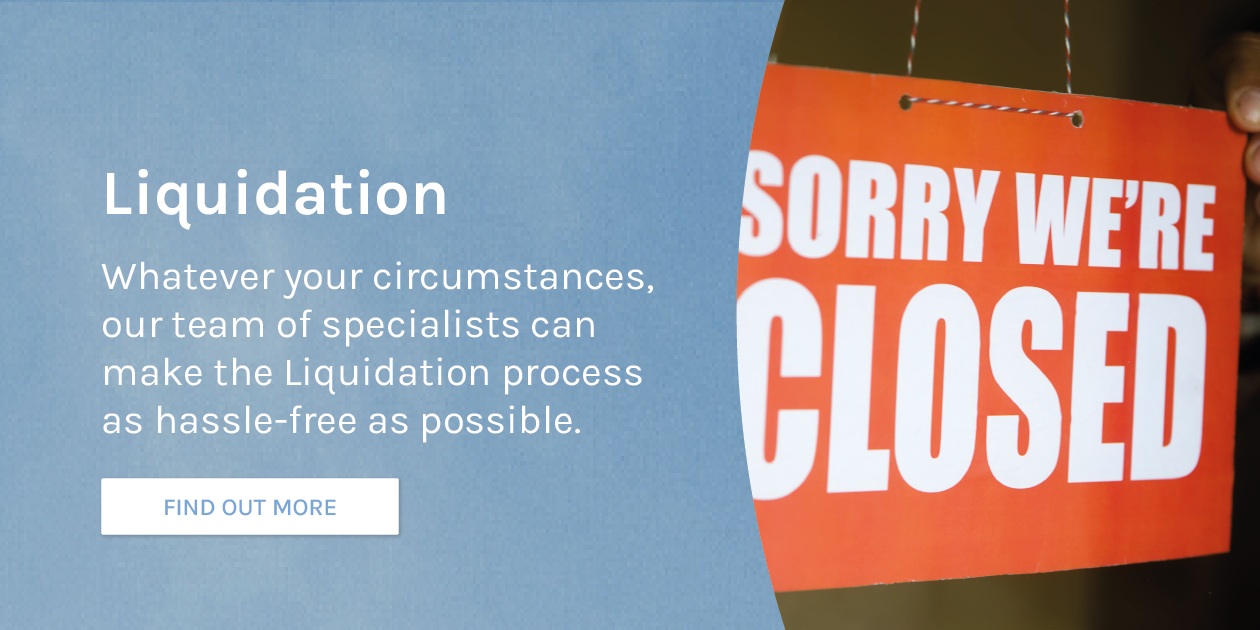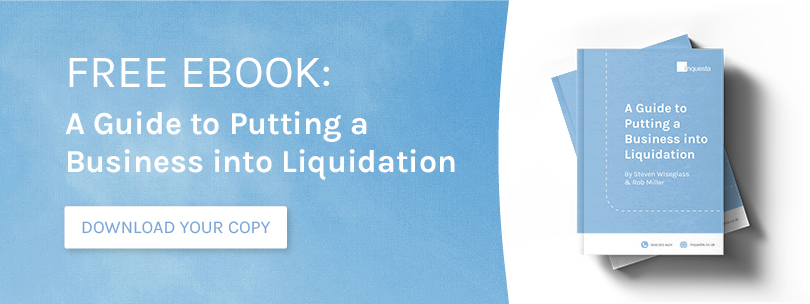For company directors, life after liquidation can go down a number of different avenues. Most promising of all is that it can free you up to explore a number of new and exciting opportunities. However, you could also find yourself held back by past mistakes, needing to deal with ongoing legal issues that could leave you feeling stuck, or you could even be found personally liable and forced to repay shareholders and stakeholders out of your own pocket.
In this blog we will explore the experience a director may face following the closure of their business, including possible ongoing responsibilities, potential liabilities, and obligations you may need to be aware of. We will also discuss what will likely happen to company assets, shares, and more.
Find out more about the possible nuances of life after liquidation and gain a clearer understanding of what you could be faced with in our blog.
What Does It Mean If A Company Goes Into Liquidation?
A company going into liquidation means it is being wound up in order for attempts to be made to repay all outstanding debts and obligations. Liquidation occurs when a business is unable to meet its financial obligations and is no longer seen to be solvent.
When a company is being wound up, you can expect a number of things to happen, including:
- Liquidator Appointed: A licensed insolvency practitioner should be appointed to oversee the liquidation process. A liquidator will take control of the business, to ensure that the process is followed as it should be.
- Company Closure: Once a company enters into liquidation, it will no longer be able to continue operations. The business will close and all employees will be made redundant.
- Debt Repayment: The main goal of a liquidator is to ensure that an insolvent business’s creditors are able to reclaim some, if not all, of the money owed.
- Business Dissolved: Upon the completion of the dissolution process, the business will cease to exist legally. This means that its name is officially struck off the register of companies.
For more information about the liquidation process, download our complimentary eBook which covers the subject in much greater detail, acting as a step-by-step guide from the beginning of the process right through to the end.
However, have you ever considered what life after liquidation will look like for company directors?
What Happens to Assets When a Company is Liquidated?
When a company is closed, its assets will typically be sold on, and any profits will be used to repay creditors (and shareholders afterwards). In some circumstances though, company assets may not need to be used to repay. This includes:
- Assets Deemed ‘Insignificant’: It may be possible for certain assets during the sale process to be deemed to have little to no value towards repaying creditor debts. For example, if the cost of selling an asset outweighs its value, it can remain with the business and its directors.
- Prior Claims: Some assets may not be available to repay general creditors due to a prior claim. This includes a mortgaged property. The sale of such a structure would be used to repay that creditor, and not used for all unsecured creditors.
- Assets Can Be Exempt: A selection of a company’s assets may be made exempt from being sold. This can include personal items, and tools/equipment/vehicles a debtor may need to continue to earn a living and support themselves after liquidation. Additionally, any assets held in a trust or as part of a pension scheme would be exempt.
- Assets Retained: Directors or other parties can, if they have an interest for sentimental or personal reasons, purchase certain assets themselves. These assets will be sold to the party at a fair market rate (as decided by an independent valuer) and any proceeds will go to repaying creditors.
What Happens to Shares When a Company is Liquidated?
When a company is liquidated, what becomes of its shares will depend on the specifics of the business and the extent of its financial issues. However, more often than not the shares will become worthless. In this scenario, investors will declare the share a capital loss and remove it from their portfolio.
If sufficient funds have been generated as part of the process, it is possible that shareholders may receive some compensation. However, a liquidator’s priority will always be to repay creditors and not to maximise the returns of shareholders, so it is exceedingly rare that shareholders receive any capital from sold assets.
For a shareholder, it is recommended that you consult with an expert with experience in the liquidation process. They can provide you with more information about if you will be eligible for financial return on your investment.
What Happens After Liquidation?
After liquidation is confirmed and your company ceases to exist in the eyes of the law, the process is not over. In this section we will explore the key steps that follow dissolution. From the striking off of your company to redundancies, cancellations of contracts, and more.
Life after liquidation can be complex. A few things you can come to expect include:
Trading Should Completely Cease
After the official liquidation process has come to its end, your company will have its name struck off the register of companies. This is done to act as the official end of the business from a legal perspective.
Therefore, if you haven’t completely ceased operating by this stage, you should stop immediately. Once a company has been wound up it is no longer legally able to engage in any trading or business activities.
Distribution to Remaining Shareholders
While a primary purpose of liquidation is to repay creditors, should any funds be left once everybody has been paid, they will likely be distributed among company shareholders.
The amount each shareholder receives will be proportionate to their financial interest in the business.
Reports Submitted and Filed
While you might expect the job of a liquidator to end upon official confirmation of the liquidation, this is not in fact true. As part of the process, a liquidator will prepare a comprehensive report to accurately document the process.
These reports will outline everything they needed to do to best repay creditors. These documents are then submitted and filed to key authorities in the field.

Contracts Cancelled
Another important job that should be resolved as soon as possible once the business has been liquidated is to terminate or settle any pre-existing contracts. Common contracts that need dealing with include:
- Lease/Rental Agreements
- Contracts with Suppliers
- Customer Contracts
- Agreements for Services
- Employment Contracts
- Financing
Employee Settlements
Letting go of employee contracts is generally part of a liquidator’s remit. However, in certain situations, some employees may be retained. This can be for a number of reasons, including to assist in the process, ensure company continuity until it is closed, to comply with employment laws surrounding notice periods, and to fulfil legal contracts.
Any employees left when the business is liquidated will need to have their affairs resolved as fairly as possible in accordance with the law. This requires them to be paid severance as per their rights. Redundancy payments should also continue to be made to eligible employees.
For more information, read our blog titled ‘What Happens to Employees When a Company Goes Into Liquidation’.
What Happens to Directors After Liquidation?
Once a company has been liquidated, the role of its directors will have undergone significant change. They will have been released from responsibilities and are free to pursue other opportunities. However, they may need to cooperate with any ongoing legal processes and they could even be held personally liable for losses incurred.
Here’s a few things you could expect once your company has been liquidated:
You Will be Freed From Responsibilities
In most situations, directors will be released from their obligations to a company once it has been liquidated and dissolved. This includes duty of care involved with the management of company affairs, and acting in the best interests of the business and any stakeholders it has.
While closure will generally mean the end of a director’s ongoing responsibilities, there may still be a number of legal obligations or liabilities. As a result, it is recommended that directors consider expert advice to better understand what can be a complex situation.
Legal Proceedings Could be Ongoing
After a business has been liquidated, its directors may still be involved in legal proceedings that were initiated during, or even following the process.
These investigations will likely be into the director’s conduct, decisions, or looking into potential mismanagement on their part leading to liquidation. Director’s are expected to cooperate with any ongoing legal proceedings to the best of their abilities. Failure to comply can lead to additional liabilities or penalties.
Personal Liabilities May Be Possible
Your business being liquidated will not automatically absolve you of potential personal liability. Directors can still be held liable following liquidation if it is deemed that their actions or decisions were not made in the best interests of the company and its stakeholders, or if they directly resulted in losses for creditors.
If you find yourself in this position, it is important that you prepare for and present an in-depth defence of your case.
Your Options Should be Open
When a company has been liquidated, directors will generally be free to pursue any number of other opportunities. This includes becoming director of another company.
However, any disqualifications placed on you during the liquidation process must be adhered to, even once the process has come to an end.
For more information about a director starting a new company following liquidation, read our dedicated blog.
Tips for Life After Liquidation From Inquesta
At Inquesta, we understand that when you spend years dedicating all of your time and attention to a business it can become a fundamental part of your life. When it is forced to close, you can feel lost. We have years of experience in the field so know just what challenges and stumbling blocks can lie ahead in what is, for most, uncharted territory.
The Inquesta insolvency team have been there and seen it all when it comes to company liquidation. Our aim is to provide a unique insight that can protect your interests in both the short and long-term and allow you to better make more informed decisions going forwards.
Whatever your circumstances may be, Inquesta’s company insolvency and recovery team are here to help. We encourage you to leverage the knowledge you gained from our guide and consider seeking additional legal advice to ensure your position is as secure as possible.
We appreciate that every director’s journey is unique, no two experiences will ever be exactly the same. This is why our team aims to always provide bespoke support and guidance to everybody we work with. For additional information about how Inquesta can support you with life after liquidation, get in touch today or request a free no-obligation consultation.



